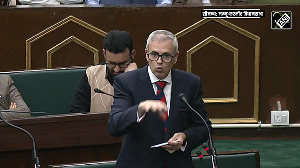Prime Minister Manmohan Singh on Friday constituted the seven-member Board for Reconstruction of Central Public Sector Enterprises.
The board has three official and three non-official members. The chairman of the board will be Prahalad Basu, former secretary, mines and progarmme implementation.
The three non-official members are Arvind Pande, former chairman, Steel Authority of India, Sushil Khanna, faculty, IIM-Calcutta, and T S Vijayaraghavan, former secretary, heavy industries and public enterprises.
The official members include heavy industry ministry secretary, who is also designated as the member secretary, and the secretaries of divestment and expenditure.
The broad terms of reference of the board include advising the government on ways and means for strengthening PSEs and making them more autonomous and professional.
The board will consider financial, organisational and business restructuring plans, including diversification, joint ventures with strategic partners and mergers and acquisitions.
It will also advise the government on divestment, closure or sale in full or part for sick or loss-making companies that cannot be revived.
All sick PSEs will be referred to the board for revival and restructuring. The definition of a sick company will be a "a company that has accumulated losses in any financial year equal to 50 per cent or more of its average net worth during four years immediately preceding such financial year or a company that is sick under the provisions of the Sick Industrial Companies (Special Provision) Act, 1985".
The administrative ministry and the department concerned will be responsible for preparing a comprehensive package for revival or rehabilitation or closure of loss-making PSEs after consultations with various stakeholders within a prescribed time frame.
The terms of references of the board was decided in consultation with the National Advisory Council, headed by chairperson Sonia Gandhi.
The NAC has emphasised that the board shall not limit itself to only restructuring of sick public sector enterprises, or advise revival packages for sick units but shall devise ways and means of strengthening the public sector as a whole.
The UPA government has pledged in its National Common Minimum Programme to devolve full managerial and commercial autonomy for successful profit making companies operating in a competitive environment.
Turnaround body
Board room: The seven-member board will advise the government on ways and means for strengthening PSEs
Shake-up mandate: It will consider financial, organisational and business restructuring plans, including diversification, joint ventures and mergers and acquisitions
Sick PSU sale: It will also advise the government on disinvestment, closure or sale in full or part for sick companies that cannot be revived





 © 2025
© 2025